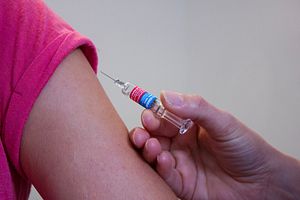South Korea, one of the rare countries to weather the unprecedented COVID-19 outbreak successfully, is now facing unexpected public distrust over the safety of seasonal influenza vaccines.
First, local news outlets reported in late September that about 5 million doses – which should have been refrigerated – had been exposed to room temperature while being transported to medical institutions. The government suspended free flu shots for eligible groups until mid-October to check the safety of the doses.
However, as the number of deaths following a flu vaccination has been rising consistently since early October, President Moon Jae-in told a meeting on Monday that it is necessary to expand the influenza vaccination this year to avert a disaster from combined outbreak of the flu and COVID-19. And he also made clear that there is no link between the flu vaccines and deaths.
“Please trust the health authorities’ conclusion and announcement that are reached [after] review with experts,” Moon said.
In the wake of Moon’s remarks, Jung Eun-kyeong, commissioner of Korea Disease Control and Prevention Agency, told a briefing on Monday that 59 deaths within a week of getting flu shots have been reported and 13 of them are being investigated. Jung also said that “more than 1,500 elderly people died within a week of being inoculated last year but their deaths were not linked to the vaccinations.”
Health authorities also supported Jung’s efforts to persuade people that the number of deaths is not unusual. Generally more than 3,000 Koreans die each year within a week after getting flu shots, but the cause of death was not linked to the vaccines.
Roh Kyung-ho, a professor of laboratory medicine at the National Health Insurance Service Ilsan Hospital, told The Diplomat on Tuesday that people have been misled by the reporting on the number of deaths this year.
“According to data released by Statistics Korea, 295,110 people died last year, 84 percent of whom were over 60. If we divide this into 365 days, about 675 people died in a day. Given that they were in eligible groups for free vaccinations, at least 50 percent of them are highly likely to get vaccinated,” Roh said. “If there was a problem with the vaccines, there should have been a big change in the death rate, but it wasn’t.”
“About the news report questioning the safety of the 5 million vaccines exposed to room temperature, I think it’s unlikely that some of them would have killed people because people usually get a 1 mg shot, which is not close to a lethal dose,” he added.
Medical experts and health authorities are worried that local news reports could amplify people’s concerns and worries over the flu vaccines could lead people to not getting flu shots.
However, more than 50 percent of those who are eligible for free vaccinations have already been inoculated, according to the KDCA on Tuesday. The government also has increased available vaccines by 20 percent compared to last year to help more people to get flu shots to prepare for the winter amid the pandemic.
Roh stated that South Korea is not having trouble managing its high-quality vaccination program. In fact, he is hopeful that amid the pandemic South Korea could see its lowest number of flu infections in upcoming months, citing the impressively low number of flu infections in Australia (which has already had its flu season). South Korea’s flu infection rate was recorded at 1.2 per 1,000 people in the week of October 11 to 17, compared to 4.6 in the same period last year.
“The flu season is from Christmas to March or April. But this time, the infection rate is likely to be significantly lower because individuals are abiding by the quarantine system and minimizing contact with each other through social distancing,” Roh said, adding that people should get their flu shots by mid-November, given that time for antibody formation after vaccination takes at least two weeks.
Perhaps the most frightening case involved a 17-year-old high school student who died two days after getting a flu shot. The autopsy this week showed that a lethal dose of nitrates was detected in the stomach, according to the National Forensic Service and bereaved family.
Nitrate is often used as a preservative to maintain the bright red color of meat. It can lead to serious breathing difficulties and death when taken at a lethal dose.
The deceased’s elder brother posted an online petition on the Blue House website, saying that it would be too unfair for his younger brother’s death to be concluded as suicide based on the result of the autopsy.
24,000 people had signed the petition as of Tuesday night local time. The Blue House will answer if more than 200,000 people sign.

































